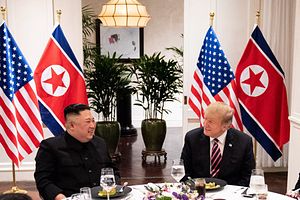One year after the Singapore Summit—which brought together Donald Trump and Kim Jong Un for the first-ever meeting of a sitting U.S. president and North Korean leader—negotiations seem to have stalled. And yet, despite the failure of the second summit in Hanoi and the resumption of missile tests by Kim Jong Un, there is still a window of opportunity for a deal. But that window won’t last forever.
The past two years of U.S.-North Korea relations have been a rollercoaster ride. After months of missile tests by North Korea and genuine concerns that the Trump administration might launch military strikes in 2017, events took an abrupt turn in 2018 when North Korea and South Korea began diplomacy and Donald Trump announced that he would meet with Kim Jong Un. While the Singapore Summit did not yield much substance, many were hopeful that it would start a process. That process never materialized as North Korean negotiators evaded their U.S. counterparts, avoiding the difficult negotiations necessary to make progress. The Hanoi Summit—which ended abruptly when it became clear the two leaders were on different pages—was the natural result of this faulty process.
Today, while both countries seem to be waiting for the other to change their negotiating posture before returning to the table, both sides claim that they are still interested in dialogue. Trump says he received another letter from Kim, and South Korean president Moon Jae-insaid that there are talks happening about future U.S.-North Korea dialogue. The Hanoi summit made clear that a “big” deal—North Korea giving up all its nuclear weapons immediately—won’t happen in the foreseeable future. Instead, the Hanoi meeting reaffirmed that any initial deal would resemble the same deals the U.S. has been discussing with North Korea over the past 25 years: North Korea trades some denuclearization for economic concessions
While the contours of a deal seem apparent, it has too often been politically toxic in the United States, South Korea, and Japan to strike or maintain a deal—or even negotiate—with North Korea. Even when the time was right politically for one country, it often wasn’t in the others. Right now, however, the politics are aligned. An interim deal that launches a more comprehensive set of negotiations with North Korea would earn the support of all relevant countries.
In the United States, Trump has flipped the script on diplomacy. While Republicans are traditionally more hawkish on North Korea than Democrats, Trump’s support of diplomacy has silenced criticism from Republicans who would normally attack such policies (remember Republican attacks on Obama for engaging with Cuba and Iran). On the other side of the political aisle, Democrats are generally supportive of diplomacy as a foreign policy tool, and while they might be critical of how Trump has approached diplomacy with North Korea, they want to resolve North Korea’s nuclear program through diplomatic means. Furthermore, the American people are supportive of diplomacy: when diplomacy began in 2018, 80 percent of registered voters supported continued diplomatic efforts to pressure North Korea. If there were to be a deal, it’s unlikely that members of either party would want to sink it.
On the other end of the negotiating table, Pyongyang says that it’s open to diplomatic engagement with the United States as long as the U.S. changes its bargaining position. It wants sanctions relief and has indicated that it’s willing to give up some elements of its nuclear program in exchange. While the exact value of sanctions relief for denuclearization remains to be calculated and North Korea’s longer-term intentions in negotiations are unclear, there currently appears to be support in Pyongyang for diplomacy.
South Korea, Japan, and Beijing likely wouldn’t be party to an initial nuclear deal with North Korea, but their support is necessary in sustaining progress with North Korea.
In South Korea, President Moon and his party, the liberal Democratic Party of Korea, continue to lobby for improved inter-Korea relations through summits and economic engagement. Their approach is politically divisive: 81 percent of members of the Democratic Party of Korea believe Moon’s North Korea policy is going well, while 83 percent of conservative opposition Liberty Korea Party believe it is not. And while South Korean conservatives usually make common cause with U.S. administrations wary of engaging the North, today the United States is in a different place.
The Japanese government’s key concerns are eliminating North Korea’s nuclear threat to Japan and the return of Japanese citizens abducted by the North Korean government. However, Japan’s overall priority is to portray itself as lockstep with the United States. And so, despite Prime Minister Abe’s wariness of the U.S.-North Korea diplomacy, if the United States were to reach an interim agreement with North Korea that didn’t fully address Japan’s concerns, Japan wouldn’t stage a public protest.
In Beijing, the Chinese Communist Party supports détente between the U.S. and North Korea—and would support a deal—because it wants to avoid being the focus of more U.S. sanctions aimed at pressuring China over its economic engagement with North Korea.
Even if the two countries found their way to a deal, it would just be the beginning of a longer process. But the United States can’t let this moment pass. If it takes the United States sending a clear message that it is willing to negotiate its positions, then the United States should do so to get talks going.
Michael Fuchs is a Senior Fellow at the Center for American Progress and a former deputy assistant secretary of state for East Asian and Pacific Affairs. Abigail Bard is a research associate for Asia policy at the Center. They are the authors of a new Center for American Progress report “The Time is Right For a Deal with North Korea,” on which this piece is based.

































